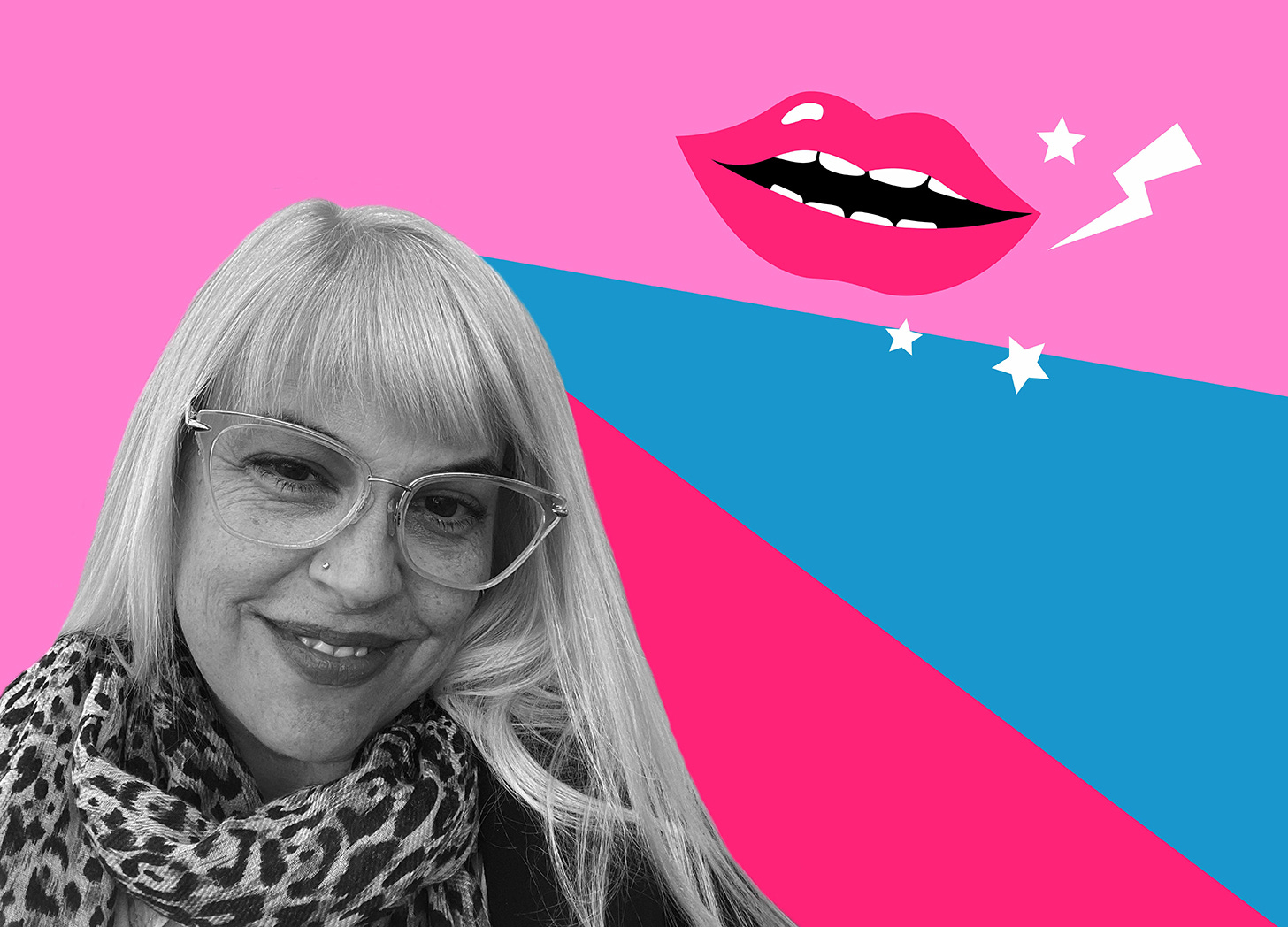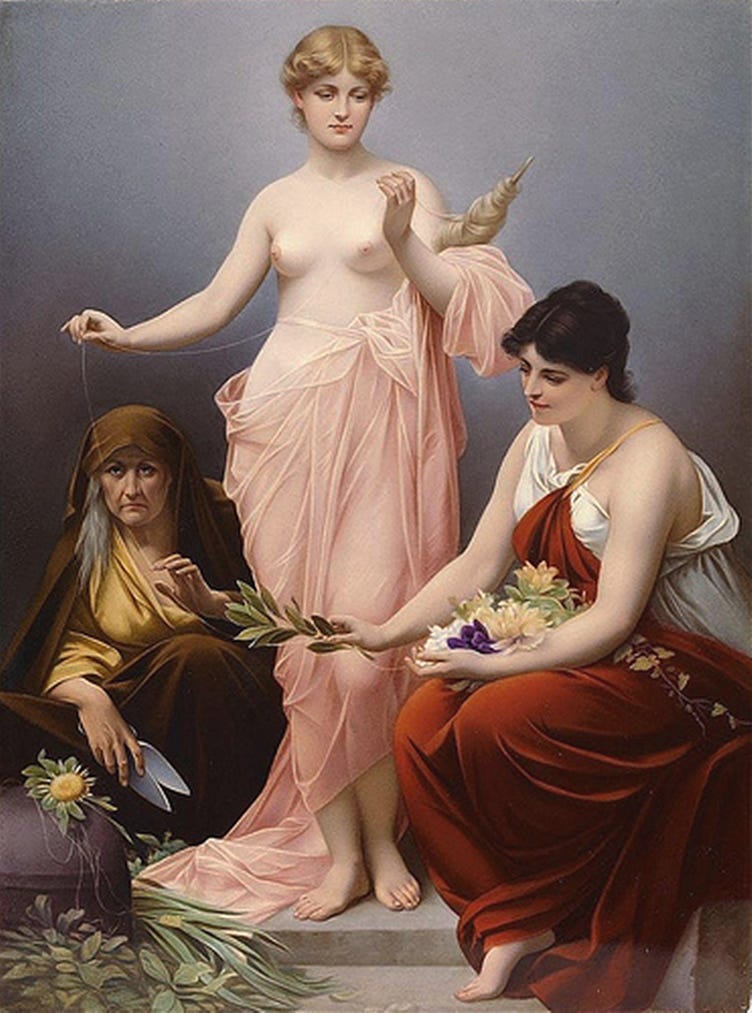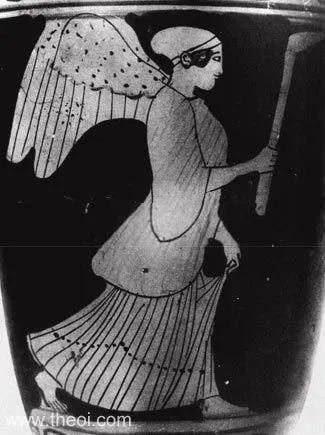Kristin Mathis TALKTALKTALKS 'Karma, Fate, Moira & Long Covid'
Poet and Translator Kristin Mathis of Mysteria Mundi opens up about her relationship with Long Covid, from the philosophical to the practical
If it wasn’t for Long Covid and personal tragedy, Kristin Mathis may have never left her job as a Waldorf school teacher. She might not have listened when Hermes came to her in a dream. And she may never have launched her Substack, Mysteria Mundi.
Kristin has been translating ancient texts her whole adult life — but since leaving University, it had become mostly Sappho’s poetry, and mostly something she did just for fun. This was different. This was a calling to Orphic Initiation. And the Universe was conspiring by taking away all the obstacles — health, partner, job security.
There were days, weeks, months, when literally all she could do was translate.
During these periods when she was too ill or sad to leave bed, she still found time and energy to pour herself into her work. One by one, in an order that would come to her in waking visions and dreams, she started translating the collection of 87 Orphic poems from Ancient Greek to living English texts. More than an obsession, it became a practice.
And without ever consciously making the decision, she reprised the role of fulltime scholar left behind over 30 years ago when she dropped out of her PhD program at Princeton.
Today her translation project, Mysteria Mundi, has attracted a devoted audience that helps her pay her bills. It’s morphed into classes, collaborations, and speaking gigs at conferences. And it’s gotten her a publisher. Revolore Press will soon release a selection of her translations as a book of devotional hymns.
I recently sat down with Kristin in her Brooklyn home to discuss Karma, Fate, Moira & Long Covid — a topic and title that came to her after one of our more casual Instagram Live conversations.
In the following interview, Kristin discusses fate and fortune as well as the realities of living with Long Covid and some practical insights for anyone facing similar struggles.
This conversation was inspired by a separate podcast episode we recorded under the same title. You can watch it here.

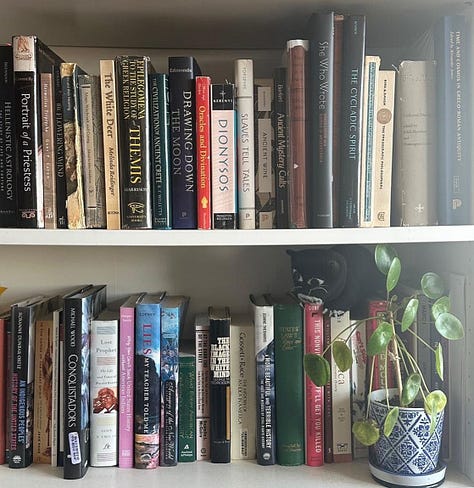
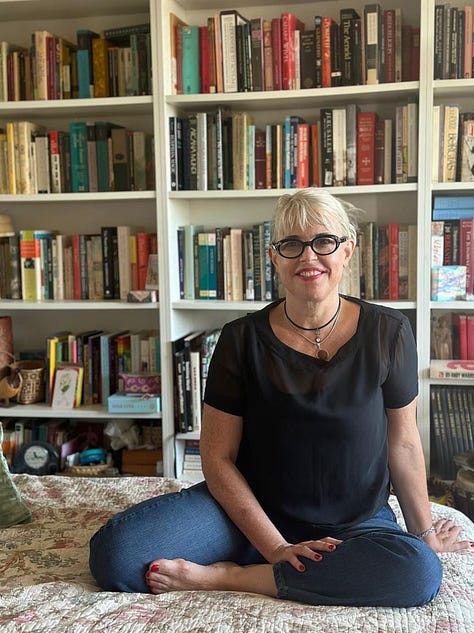

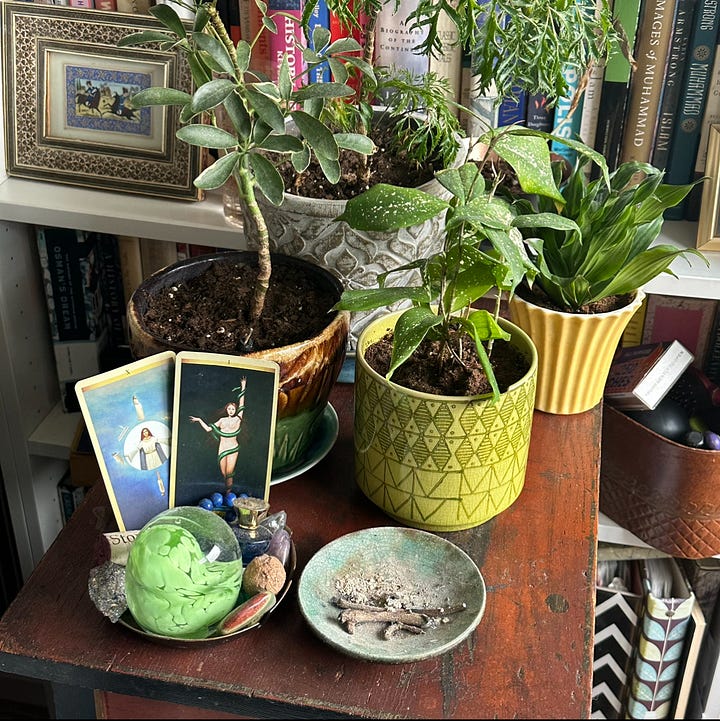
CV Henriette: We recently recorded a podcast entitled, ‘Karma, Fate,Moira & Long Covid.” And while I’m tempted to start with “please explain that,” I’ll try to get there organically by breaking it down from the beginning:
Let’s start with Karma and Fate. For the sake of this interview, can you provide working definitions?
Kristin Mathis: As someone who studied Tibetan Buddhism for much of my 20s and 30s, my understanding of both karma and fate owes a lot to Buddhist ideas of “dependent origination.” This is a Buddhist philosophical term used to talk about a world that is both always in process, and is always inextricably entangled.
My Buddhist root teachers Tulku Urgyen Rinpoche & Chokyi Nyima Rinpoche, as well as Buddhists from other lineages (like the more widely known Thich Nhat Hanh) teach us that everything (including all life forms) arise in multiple, inter-dependent ways, and as we/they change, we/they set off further ripples of inter-being.
We are therefore always already interconnected, and always already co-evolving. Changing one part of the whole changes multiple parts of it, because none of us exists as a discrete “self” independent of factors ranging from our parents, to our environment, to the microbes in our guts, to the viruses we inhale from others’ exhalations. Who “Kristin” is, is both infinitely more porous and vulnerable AND infinitely greater and multiplex than what we, as modern Westerners, have been trained to believe.
“Karma is not ‘the sum of all the good or bad things you’ve done,’ like some sophisticated Santa naughty/nice list.”
So, with that background in mind: I was taught that “Karma” is the set of circumstances that gave rise to the present moment AND the set of circumstances that are going to give rise to future moments. It’s an ongoing, ever-evolving and swirling stream of arising, becoming, and dissolving. Karma is not “the sum of all the good or bad things you’ve done,” like some sophisticated Santa naughty/nice list. To talk about Karma is simply to acknowledge all the beings and events (chosen and unchosen) that brought us here as well as the beings and events (chosen and unchosen) that will go on to produce our future selves.
We can’t control all the factors making up our karmic stream, but we DO have a certain amount of control over what happens in the future through the choices we make right now. The payoff for our actions and interrelationships is sometimes rapid, but other times can take years or even lifetimes to manifest. That’s my understanding of karma received through the wisdom and experience of my teachers. I’m sure there are over-simplifications in there, but those are my fault, not theirs.
Now, the Fates, as understood by the Orphics, are somewhat similar to Buddhist ideas of Karma, but they also have a mythology and specificity to them that I’m still in the process of parsing out. Every time I translate another Orphic Hymn I feel like I get another small piece of the puzzle.
Like the Buddhists, the Orphics are non-dualists. They have a very sophisticated understanding of interdependence (or “dependent origination”) as well as an understanding of causality that spans lifetimes. As for the Buddhists, Orphics saw “the human being” arise as a series of processes that both pre-dates birth and will survive death.
On a cosmic level, Necessity (which the Orphics understood as a divine being AND a cosmic force) is what literally holds the cosmos in place. It gives us our apparent separability. Meaning, we all really ARE one. But in order to exist in time and space, to be visible as discrete entities in the cosmos, some force has to hold us into specific bodies at specific spacio-temporal locations. “Kristin” exists as a set of bodily processes that came into being in 1971. The force that creates the appearance of a solid self, that allows you to see “Kristin” as separate from “Vivi” or “Joe” is Necessity. The Orphics called that separating and fixing force Necessity because we “need” to have separation in order to exist in this world. Without Necessity, the All would be undifferentiated pure Being.
The Orphics depicted Necessity as holding a drop-spindle, from which the cosmos (that is, all that exists in space-time) is spun. The spindle is both a metaphor and a very literal heavenly phenomenon — the cosmic axis that extends from celestial pole to celestial pole. To draw out that whole cosmology is too much here, but Drew Levanti and I go into that a bit more in our STAR class, for those who are interested in diving deeper.
CVh: Who were the three Fates? What did they spin?
KM: The three Fates are familiar figures in Greek mythology. As with every deity or mythological figure, there are multiple versions of their story. I’ll just talk about how they are understood by the Orphics, and I think you’ll see why that was foundational to later Hellenistic astrology.
For the Orphics, the Fates are how the Mind of the All (the “Mind of the All” being another name for “Zeus”) manifests outwardly into the cosmos, revealing the particular paths and processes of everything in the cosmos.
In art and myth, the Fates were depicted as three female divinities named Atropos, Lachesis, and Klotho. Those names translate literally as “Unchangeable/Un-turnable,” “Disposer of Lots/Destinies,” and “Spinner.” A common Ancient Greek folk idea was that Klotho spun your thread of fate, Lachesis gave it a certain length or pattern, and when you came to the end of your life, Atropos cut the thread.
Mystery philosophers, like the Orphics, acknowledged this popular understanding, but also understood the myth as having deeper cosmic meaning.
I’m still working on the Orphic Hymn to the Fates, because it has some of the most complex and challenging esoteric language in it I’ve encountered in the poems, but so far, what I can see is that it contains an understanding of the Fates that is reminiscent of, but also different than the understanding of Fates found in myth on the one hand, and in later Platonic philosophy (meaning Plato and onwards) on the other.
For the Orphics, there is some sort of imagery going on where Necessity is holding the celestial axis, and off that axis “spins” the cosmos. Each being, as it is born into the world, begins to “sail” along the particular course charted out for them by Necessity’s spindle. That course is known as the Fates (or sometimes, as one’s Fate).
The Fates are thus NOT a “one and done” prophecy of what will happen to us. They are what HAPPENS to us, as well as the MAP that gets us there, as well as the specific MEANS BY WHICH we are held as separate beings within and through the ALL.
“At my worst, I’ve been bed-ridden and unable to walk more than about two blocks without sitting down. In those moments I’ve had to tape lists of everyday needs to my wall in order not to forget: “Get up. Brush teeth. Make kid breakfast. Take pills.”
CVh: Moira. This one’s my favorite. For the Ancient Greeks, this was the word for degree, yes? I learned that from you. Would you please expand on that?
KM: Yup! This is one of those things that is so obvious once you know it, but is sort of glossed over both within the academy and in astrological circles. Moira means “Fate.” The Moirai are “The Fates.” But “Moira” is usually translated as “degree” in English translations of Hellenistic astrological texts, and that’s definitely not how it would have been read by Ancient Greeks.
An example from Vettius Valens 1.3.1, first as translated by Robert Schmidt, and then in my more literal translation.
Schmidt: “The first six degrees of Aries, those of Zeus, are temperate, robust, abundant in seed, benefic.”
Mathis: “The first [word missing] fates [moirai] of the Ram are of Zeus: well-ruled, eager/strong, much-seeding, doing good.”
There are a few things to note here. First, the original editor of the Greek edition (David Pingree) supplied the number “six” as a plausible solution for the missing word in the text, and Schmidt followed him. That’s a pretty common practice in translation, though it’s usually good practice to note when you’ve done so.
But more importantly, reading the word moirai as “fates” rather than “degrees” makes the whole passage, I think, come alive. For ancient Greeks, each tiny segment of the sky that we call a “degree” was not merely an abstract geometric measurement. Rather, each moira was an ANIMATE SPACE-TIME FIELD.
Let me unpack that: By “Space-time field,” I mean each moira was a section of the sky (space) as it appears at a particular moment (time). And by “animate,” I mean it is/they are ALIVE. Each moira is a BEING.
So what does that do to our understanding of our charts? Well, for one thing, when we are born, we are birthed by and into a set of BEINGS.
Therefore we can think about our birth chart as sort of a family photo — a snapshot of our fate - family, as it were. And because each fate (aka degree) of our chart is ALIVE, we can get to know them, talk to them, influence them, build relationships with them.
This is where non-dualism as an operating assumption gets really important. There’s this idea among many students of ancient astrology that Fate (or the fates) are EITHER something fixed OR something that we can change. You see this in the old “destiny vs. free will” debate.
But the question itself just doesn’t even make sense in the context of the animate Orphic cosmos. The Fates are BOTH fixed (the particular moment in space-time we were born, or the predictable movements of the heavens) AND mutable (because they are beings with whom we can form relationships). We’re all in motion, together, interdependently, arising in each moment in a cosmic dance of (to steal a Thich Nhat Hanh term) “inter-being.”
CVh: What is Long Covid? I’m curious if you could provide a loose medical definition as well something of your personal experience? How has Long Covid shown up for you?
KM: Long Covid is a set of symptoms caused (researchers think) by the persistence of the Covid virus in the body long after the acute phase of the illness is over. It can happen even if (like me) you never had observable symptoms during the acute infection phase, and it tends to surface from 6 weeks to 3 months AFTER the initial illness seems to have resolved. For this reason, it’s often difficult to know at first whether or not the symptoms are caused by Covid. It’s similar in some ways to other post-viral illnesses like Chronic Fatigue and Fibromyalgia, but it has its own way of expressing itself in the body.
The symptoms experienced by each person who goes on to develop Long Covid differ greatly, but there are some that are almost universal, including post-exertional fatigue (bone-wearying tiredness that comes on 1-3 days after exercise or other types of exertion), brain fog (reduced clarity in thinking, especially in organizational or “executive function” capacities), short-term memory and attention issues, shortness of breath and heart palpitations that are not the result of obvious cardiac or pulmonary issues, certain types of skin rashes and bruising, etc. etc.
For me, there have been waves of illness. During acute phases I have shortness of breath, massive post-exertional fatigue, heavy brain fog, heart palpitations. At my worst, I’ve been bed-ridden and unable to walk more than about two blocks without sitting down. In those moments I’ve had to tape lists of everyday needs to my wall in order not to forget: “Get up. Brush teeth. Make kid breakfast. Take pills.” When I’m in an acute phase there is almost NOTHING I can take for granted that I will remember or be able to do.
With good physical therapy and a lot of supplements and self-care, I am usually able to climb out of those acute-phase holes in about 3-4 months, and then I have periods of another few months where I’m in a relatively high-functioning place. By “high-functioning” I mean I can go through the very basic everyday functions my life requires. I can get up in the morning and get my child off to school. I can sit down and translate for about 1-2 hours. I can make dinner while I still have energy in the morning and then take a walk and rest before my son comes home. I can help him with homework. Notice that there is nowhere in either the acute or non-acute phases where there is energy/space for me to make money (outside the 1-2 hours/day of translating I can do on a good day). In that sense, even when I’m in a “good place” with my Long Covid, I am still disabled. I haven’t worked in two years and as a single mom with no child support, that is really, really hard.
My parents and sister have been helping me financially, and my friends and neighbors help me with practical things. It is so humbling to accept that help, especially at my age, when I’ve been supporting myself for the past 30 years and my son for the past 18
“My dream life is more active. I paint more (partly because I can often paint, even if I’m unable to think well). I take long walks to speak to the sparrows on the sidewalks and collect Cypress cones in the park.”
CVh: Something we discuss often is that Long Covid has taken away from the executive function part of your brain and not the poetic, artistic part. For example, you seem to have no problem translating the Orphic Hymns each morning, but, some days, figuring out how to set up a ZOOM meeting is a struggle.
How has this shaped your relationship with your work? Both your output as well as the way you work?
KM: Learning to pace myself (as in the literal medical practice of “pacing” as defined here and here) has been challenging, but probably the single biggest thing that has helped...I was lucky to attend a patient-led Long Covid Healing Summit early on in the pandemic where I learned about this strategy. On a practical level, for me, that means that I lie flat without any input (sensory or physical–no TV, phone, podcast, etc) for about 15-30 minutes multiple times a day. During “good” phases, I only need to do this once or twice. During acute phases, I might spend half my day this way.
Obviously, that means I translate very, very slowly — often just a few lines a day. That has been an AMAZING practice to lean into, as it really allows me to sink my teeth into each and every word or phrase. That’s important in esoteric texts, where so much of the language is intentionally encoding multiple levels of meaning. By allowing space for each line of text to “mellow” in my head before translating, I’ve been able to produce a much richer, more meaningful text, I think.
On the other hand, going so slowly means that it will literally take years before I’m ready to publish all the hymns. That’s why I started my Substack — because I needed a way to release translations one at a time, in a way that honors my own pace and practice.
Another unexpected benefit of all the “down time” I need is that it opens up space for other beings and voices to come through. My dream life is more active. I paint more (partly because I can often paint even if I’m unable to think well). I take long walks to speak to the sparrows on the sidewalks and collect Cypress cones in the park. All of these activities allow other beings’ voices to interweave with my own and produce a fuller, more nuanced and interconnected understanding of the Orphic texts.
Orphic cosmology is vibrant and alive. Slowing down has allowed me to deepen my experience of that, and so, ironically, I don’t think I could produce the same level of scholarship if I weren’t chronically ill.

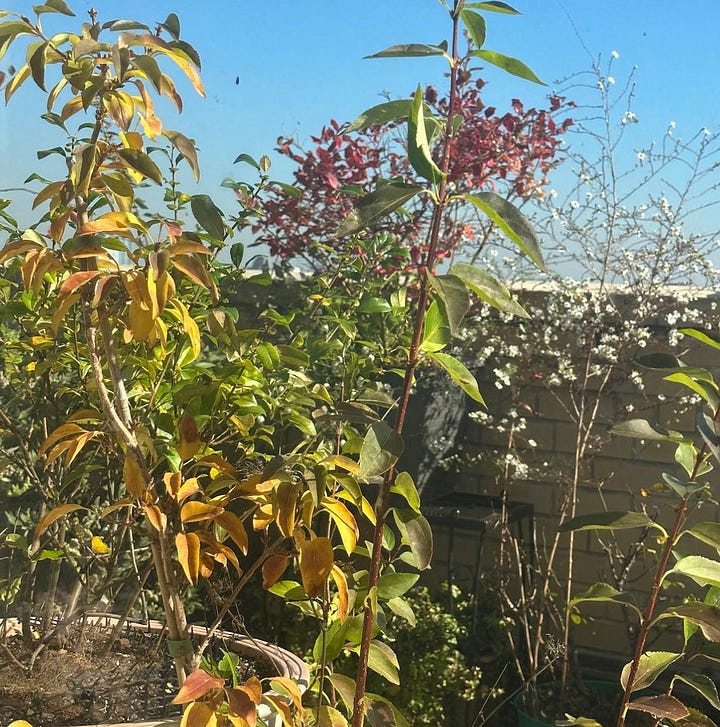
CVh: You’ve stated that Long Covid’s appearance in your life came during, and brought with it, a period of “bad fortune,” that ultimately brought you closer to your “fate.” Your partner passed. You lost your ability to work your full time job. At the same time, you’ve figured out how to make a living doing the translation work you’ve been doing in private for 30 years. You’ve found time to write a book, etc.
I hope this question isn’t too reductive: What has your lived experience taught you about fate and fortune? What has Long Covid’s role been in all of this?
KM: This is a hard question to answer, because I would never want to say something as simple as “illness is a gift.” And certainly, you can never say that on behalf of another person. So what I’m about to say is specific to me at this particular moment in my life, and shouldn’t be taken in any way to be a statement on the fundamental nature of illness or disability. There are others who have been living with chronic illness for far longer than I have who are better placed to comment on that. (One of my favorite speakers on disability or “crip” ontologies is Craig Slee, whom I met in philosopher/author Bayo Akomolafe’s online course on practices of fugitivity.)
For me, though, I’ve begun to see a subtle difference (perhaps call it a fractal face?) in the way that Necessity manifests in my own life.
My “fortune” (Greek: tuxē) these past two or so years has been, by any external measure, terrible. I’ve watched my beloved partner slowly fall into severe mental illness, then relapse into heroin use after 27 years of being clean. He died in August 2022 of a fentanyl overdose. During that same period when I was caring for him, I fell ill, had to stop working, used up all my savings, and now rely on family and public assistance to make ends meet. In early 2023, even though I mask religiously, I fell ill with Covid a second time just as I was starting to feel like I was recovering. So I’m now in my second bout of severe Long Covid symptoms, and continue to experience all the symptoms that go along with that.
To give readers an idea of what that means: it took me more than two weeks to answer these questions because I can only write on days when my brain is functioning well enough to produce clear sentences. Some days I just can’t do that. So my “fortune” — in the sense of the external events or conditions of my life — has caused me a lot of pain and suffering.
But on the other hand, during that same time, my spiritual life, which has always been important to me, has flourished in new, surprising ways. One of the most unexpected was the way my translation practice has developed into a new vocation. In the absence of all the other ways I tended to define myself (as partner, as schoolteacher/principal, as an “overachiever,” etc.), this little practice of translating a few lines per day of Greek poetry has brought me enormous joy, wonder, and a much deeper and richer spiritual understanding of the cosmos and our place in it.
In this sense, it has become apparent to me that I am called to translate these hymns. It is my vocation, in the sense of a spiritual task I need to do. I don’t have a choice, so I can think of it as my Fate. It feels like this is what I came into this life to do. That, and being a parent to my son.
I’ve been a serious student of religion my whole life, and in my youth spent many years studying Tibetan Buddhism, as well as various other varieties of “mystical” and esoteric spirituality. But the level of teaching I’ve received from this illness is on board with, say, the birth of my child. Becoming a parent is a fiery, intense, dangerous initiation rite into the Mystery of Love. So is illness, if I let it be one.
CVh: As much as our conversations tend toward the mythic and philosophical, I know that sharing your experiences around Long Covid, to help others in very practical ways, is also something that’s important to you. To this end, let's get into the details of your healing, shall we?
You’re part of a Long Covid research study. How did you get involved? Has it been helpful?
KM: Yes, I’m currently part of the Yale University Paxlovid study. Since it’s halfway finished, I’m not sure if it’s still open to people, but I think they may run another one in the near future. The best way to become informed about that is to sign up on their website and register in the app. That’s how they communicate about all the upcoming opportunities, which include not just clinical trials, but also webinars and community forums. The SurvivorCorps website and facebook group is another great resource for folks.
It’s too early for me to know whether the 15-day course of Paxlovid (which is currently only available to clinical trial participants) will turn out to be useful for me. I don’t even know yet whether I got the real deal or placebo. But there are lots of other things I DO know have been helpful and are supported by folks on the forefront of research.
CVh: In the past, I've struggled with symptoms that seem to be Long Covid related, and you’ve been super helpful with sharing resources. Perhaps we can walk this interview home with your top five or so tips for relieving Long Covid symptoms? I know there’s mushroom and craniosacral therapy. Why? What else?
KM: Sure.
Pacing. I talked about this above, but it’s the single biggest thing you can do to help you recover.
Supplement Regimen recommended by the Mount Sinai Post-Covid Program. It goes without saying that I’m not a doctor and that you should consult with your own physician, etc. But these are relatively safe for most people to use, and come recommended by many doctors in the field of post-Covid recovery.
500 mg daily of Tumeric (a natural anti-inflammatory)
500 mg daily of Quercetin (a natural anti-histamine)
500 mg daily of CoEnzyme Q-10 (for cellular repair and heart/brain health)
Herbal tonics for lung health. I vary mine according to the seasons, but right now for Autumn here in the Northern Hemisphere, I’m taking Mullein and Elecampane. I grow these myself, and Sarah from Rowan & Sage has been instrumental to my greater understanding of herbcraft. I also benefitted at the beginning, most acute stages, from David Harmon’s Chinese herbal formulas.
Mushrooms! I take a LOT of them…Reishi, Turkey Tail, and especially Lion’s Mane for cognition. Of course I eat them fresh whenever I can, but I also drink Everyday Dose coffee instead of regular coffee (it took a moment for me to get used to, but was so worth it), and if I need a boost in the afternoon I use Ryze’s Matcha Mix. (I don’t get paid to say this…I’m just saying it because they really have helped me.)
Physical therapy following the Mt. Sinai Post-Covid protocol. It is very important to use a specifically post-covid therapy protocol, because regular physical therapy will actually make you worse if you’re suffering from post-exertional fatigue. This was hard for me to accept at first, because I had been SO active prior to Covid. But trust me, it’s worth doing, even if it seems silly or super easy at first.
I could say a lot more about recovery, but these are the top five things for me, along with support from other chronically ill folks. The social aspect of finding people who really get what you’re going through is really important too.
CVh: Now to the future! Can you share something about this book you’re getting ready to release? Anything else super exciting to share?
KM: I’ll be releasing a small selection of my Orphic Hymn translations with Revelore in 2024. It’s intended to be a devotional book, fit to be used as part of a personal practice, and will contain thirty-some hymn translations alongside some of my original artwork inspired by the hymns.
I’ve chosen and arranged the contents to fit the days of the week, since reciting the planetary hymn of the day is a practice already familiar to many folks. There will also be an introduction that contextualizes the hymns and helps people understand them, but there won’t be extensive commentary in this first book since it’s meant to be small enough for practical devotional use.
I’m also working on a much longer, multi-volume work that will include extensive commentary on each hymn. But that will take several more years to finish. In the meantime, this devotional book and my Substack are the best ways to delve into the Orphic Mysteries with me. Any class I teach or conference talk I give is announced through my Substack mailing list, so that’s the place to follow me.
Subscribe to Kristin’s Substack, Mysteria Mundi, to read her writing and ongoing translations of the Orphic Hymns.
FOR FURTHER ENTERTAINMENT:
LISTEN to TalkTalkTalk w/ Kristin HERE
Read Kristin Mathis TalkTalkTalks the Art of Translation HERE.
FOLLOW ART of the ZODIAC & Vivi Henriette on INSTAGRAM + YOUTUBE + SPOTIFY for the latest TalkTalkTalk
Wanna support TALKTALKTALK? Make new friends? Learn Astrology? Subscribe to ART of the ZODIAC on Patreon.




